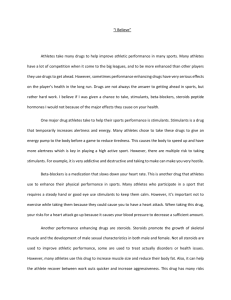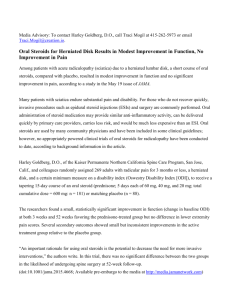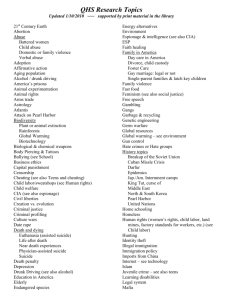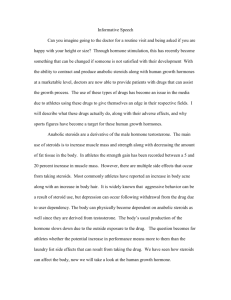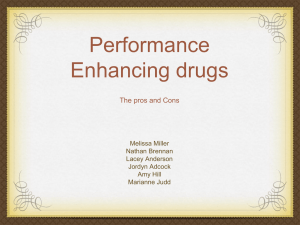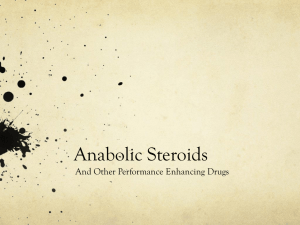Does Congress have the right to regulate steroids in professional
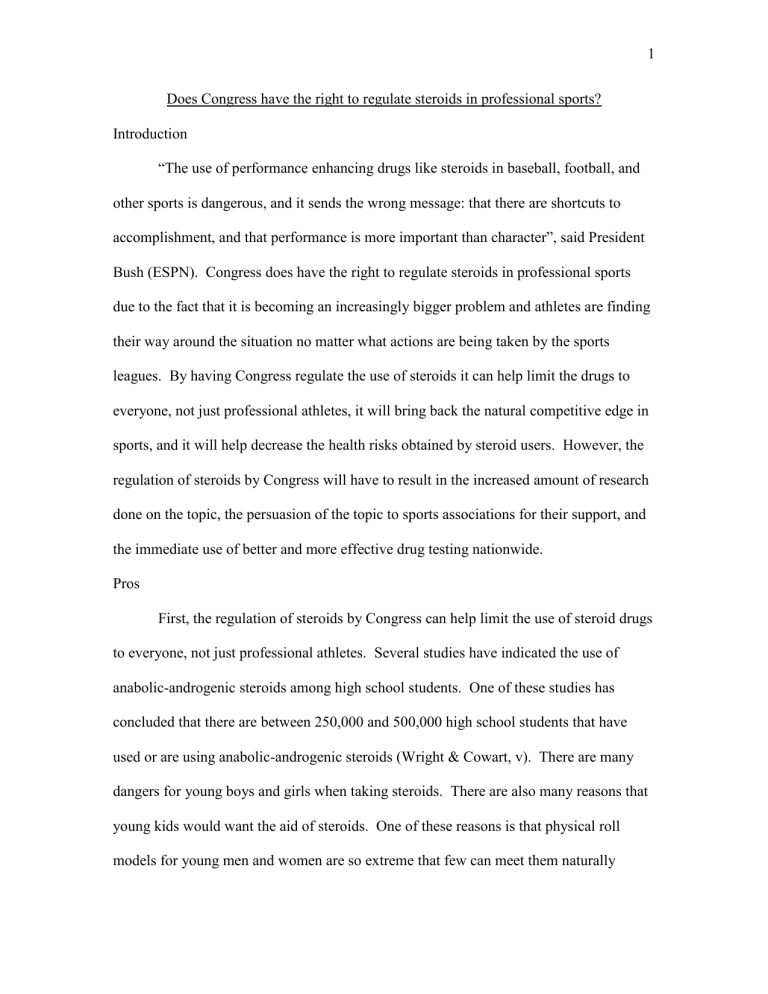
1
Does Congress have the right to regulate steroids in professional sports?
Introduction
“The use of performance enhancing drugs like steroids in baseball, football, and other sports is dangerous, and it sends the wrong message: that there are shortcuts to accomplishment, and that performance is more important than character”, said President
Bush (ESPN). Congress does have the right to regulate steroids in professional sports due to the fact that it is becoming an increasingly bigger problem and athletes are finding their way around the situation no matter what actions are being taken by the sports leagues. By having Congress regulate the use of steroids it can help limit the drugs to everyone, not just professional athletes, it will bring back the natural competitive edge in sports, and it will help decrease the health risks obtained by steroid users. However, the regulation of steroids by Congress will have to result in the increased amount of research done on the topic, the persuasion of the topic to sports associations for their support, and the immediate use of better and more effective drug testing nationwide.
Pros
First, the regulation of steroids by Congress can help limit the use of steroid drugs to everyone, not just professional athletes. Several studies have indicated the use of anabolic-androgenic steroids among high school students. One of these studies has concluded that there are between 250,000 and 500,000 high school students that have used or are using anabolic-androgenic steroids (Wright & Cowart, v). There are many dangers for young boys and girls when taking steroids. There are also many reasons that young kids would want the aid of steroids. One of these reasons is that physical roll models for young men and women are so extreme that few can meet them naturally
2
(Wright & Cowart, 2). Therefore, if Congress steps up and regulates the use of steroids in the professional world of sports, in turn, it is much more likely that it will decrease the use of the drugs among younger people as well.
Second, with Congress regulating the use or steroids in professional sports it will help bring back the natural competitive edge in sports. In this day and age, it is never really known who is exactly taking these performance enhancing drugs and who is not. It seems as if there is always some excuse and a way out of the situation concerning steroids. However, what is known is that the younger generations are having a harder and harder time gaining the potential to achieve success in the professional world of sports. Congress can help bring the sports world back to the basics of natural talent, hard work, and dedication with the regulation of steroids in the states.
Third, the regulation of performance enhancing drugs in professional sports can help decrease the health risks obtained by steroid users. People and athletes who consume steroids normally consider themselves in better shape than their peers (Yesalis
& Cowart, 51). However, there are several harmful health risks that are directly related to the use of anabolic-androgenic steroids. Some health risks for people who intake steroids on a consistent basis include extra oil and acne produced by the skin, muscle and bone injuries including the rupture of tendons, infertility, heart disease, stroke, heart attack, prostate diseases, liver disease, cancer, increased aggression, and user dependence. Women who consume steroids can produce masculinizing effects along with the previously stated consequences as well (Yesalis & Cowart, 52-61). With the control of steroids in professional sports by Congress, the harmful health effects stated above can be minimized in both athletes and other users.
3
Cons
First, the control of steroids in Congress will need to result in the increased amount of research done on the topic. No matter what is done with research and education, it will not exactly stop athletes from using steroids. Drug testing needs to become better and more effective which is a big step in the world of sports. There need to be better developed testing systems that are scientifically accurate, fair to all competitors, and immune to politics and corruption (Voy, 172). Athletes can be very smart about the anabolic-androgenic steroids that they are using in conjunction with the drug tests that are being administered. Drug abuse by athletes is getting considerably harder to identify substantially (Voy, 168).
Second, the persuasion of this topic to sports associations for their support will be essential in the regulation of steroids by Congress but it will not necessarily be easy. For example, according to a January 20, 2006 article on ESPN.com relating to President
Bush’s comments on getting rid of steroids in professional sports, Gene Upshaw, executive director of the NFL Players Association, said the President could not have been referring to pro football. Upshaw said, “I don’t know who the President is talking about, but he’s not talking about the NFL, because we’ve already dealt with steroids, performance enhancing drugs and all of that” (ESPN). The support of the leagues and associations is vital to the regulation of steroids in professional sports but some of these organizations are in denial and do not want to deal with the problems that these athletes face.
Third, the regulation of drug testing and steroid use by Congress will need the immediate use of better and more effective drug testing nationwide which is a big step to
4 take. One idea for more improved drug testing in the professional world of sports is to take away the responsibility for drug testing of the athletes from the sports federations and establish an independent agency directly in charge of controlling the drug testing of steroids in athletes (Voy, 174). Maybe if an independent agency could be in control of the drug testing then more athletes would be punished for the use of performance enhancing drugs. Right now there are so many people and professional athletes getting away with the use of steroids. However, if there were a federal independent agency in charge, with no bias, then it might make people realize that being prosecuted alone for a steroid offense can have a serious lasting impact on their life (Collins, 49).
In my opinion, I believe that steroid use in the United States and in the world of professional sports has gotten completely and utterly out of control. It seems as if everyone in the world of sports is way too concerned about the success of their particular team or organization to watch out for the healthiness and good of the lives that are making the organizations as popular as they are. In other words, winning is much more important than the use of steroids among athletes. The pressure that is being put on the athletes to break records and be super human beings is outrageous. Also, it is becoming increasingly harder for young men and women to enter the professional world of sports because of the severe competition that is not always based on natural talent. This can result in the increased use of steroids among the younger generations who look up to these professional athletes and dream of becoming an athlete as well. Regardless, sports have been popular back before the use of the steroids even existed so the fact that there has been this much controversy and hardly any action against it is disgraceful. Congress
5 should regulate the use of steroids in professional sports because if they do not, then it might possibly never get done at all.
In conclusion, Congress should regulate the use of steroids in professional sports.
This has become an increasingly bigger problem among the world of sports and something has to be done about it. By having Congress involved with the regulation of steroids it can help limit the drugs to everyone, not just professional athletes, it will bring back the natural competitive edge in sports, and it will help decrease the health risks obtained by steroid users. With all of these good points there are some more difficult points to address as well. The regulation of steroids by Congress will have to result in the increased amount of research done on the topic, the persuasion of the topic to sports associations for their support, and the immediate use of better and more effective drug testing nationwide. These last points are going to require more time and involvement with research which could be lengthily, more persuasion to the sports organizations which will be extremely difficult, and time and money spent for more effective drug testing. Although these steps will not be easy, they will definitely help make a difference in the use of performance enhancing drugs like anabolic-androgenic steroids in professional sports and among all athletes. Rep. Tom Davis, R-Va., said, “Let’s be clear:
This is a national public health crisis, it would be irresponsible if the government chose not to get involved” (USA Today). Hopefully with this message, there will be some action taken on this subject.
Congress ordered Major League Baseball up to bat this spring, then whistled an inside pitch past its institutional ear. The message: Clean up your act on steroid testing, or we’ll clean it up for you (USA Today)!
6
